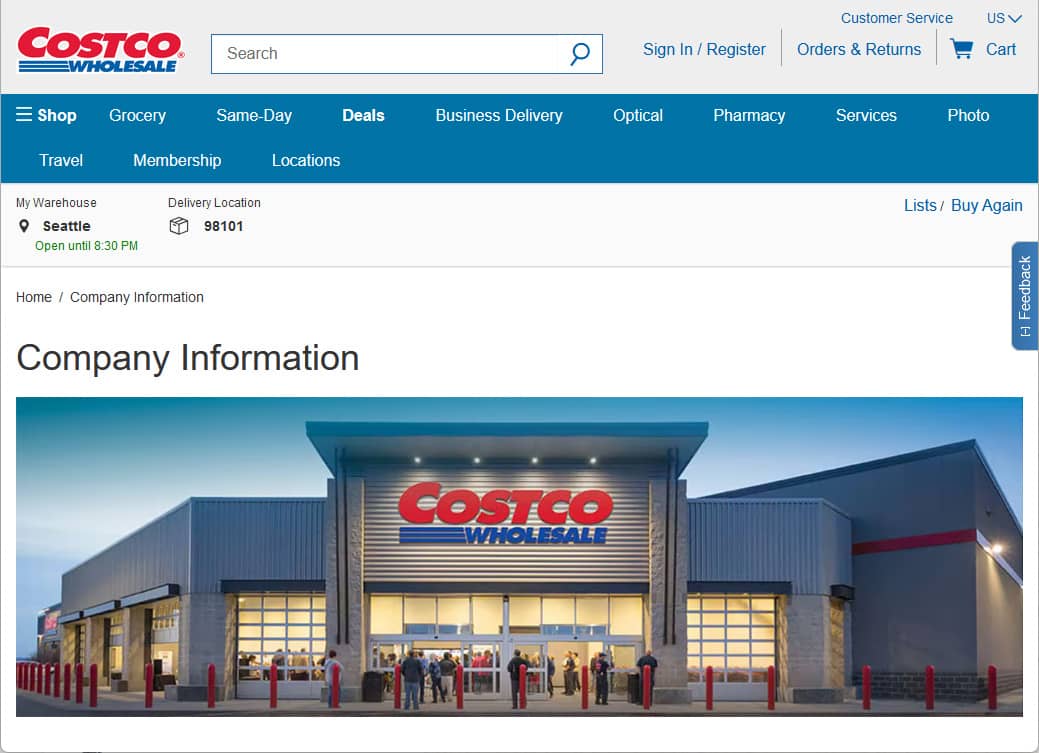Costco is an international retailer with a Price Club format exclusively for members with a current membership. It is the world’s second-largest chain in the retail category, and as of 2014, after Walmart, it is also the fifth-largest retailer in the United States. This supermarket chain specializes in selling a lot of products at a lower price than it would be in other shops. And it has its own Kirkland brand.
In this article, we will explore who owns Costco, who is the CEO of Costco, and other key details about its history and structure that will give us a clearer picture of how this company works and how it is run.
Table of Contents
Who Owns Costco?
Costco Wholesale Corporation is one of the world’s most recognized retail chains, known for its business model based on selling products in large volumes at competitive prices. Since its founding in 1983 in Seattle, Washington, Costco has grown exponentially, consolidating its position as a leader in the membership club segment.
If you are wondering, who owns Costco? You should know that Costco is a public company, trading on the NASDAQ stock market under the symbol COST. This structure allows it to attract significant investment from shareholders around the world, who have confidence in its successful business model and its capacity for sustained growth. As a public company, it has no parent company, operating independently.
Costco’s major shareholders include institutional investors and renowned mutual funds like Vanguard Fiduciary Trust, BlackRock Advisors, State Street Corp, Geode Capital Management,... Institutional shareholders are global investment management giants that own a substantial stake in the company. They rely on Costco because of its strong financial track record, its focus on innovation, and its ability to maintain a loyal customer base through its membership program.
If you want to know which are the main competitors of Costco you can read this article: Costco Competitors and Alternatives.
Who is the CEO of Costco?
Ron M. Vachris, current CEO and President of Costco Wholesale Corp. has devoted much of his life to the company. His career began in 1982 as a forklift driver at Price Club, which was a predecessor company to Costco. Since then, he has risen through the ranks, holding positions such as executive vice president of marketing, senior vice president of real estate development, and general manager of the Northwest Region. Vachris reflects Costco’s culture of internal growth, where the professional development of its employees is encouraged. His promotion from an operational position to senior management is a reflection of his dedication and commitment to the company.
Despite his position as CEO, Vachris works in a regular office within the company’s headquarters and enjoys interacting with employees. His leadership is characterized by a hands-on approach and a deep understanding of Costco’s operations and business.
The History and Organizational Structure of Costco
Costco is one of the world’s largest discount department store chains. Founded in 1976 in San Diego, California, under the name Price Club, the company initially focused on offering bulk products at low prices, mainly to small businesses.
A key milestone in Costco’s history was the merger with Price Club in 1993. This merger consolidated its market position and allowed it to expand its geographic reach. Since then, Costco has experienced steady growth, opening shops in numerous countries and diversifying its product offerings.
Unlike many other large retail chains, Costco has kept its business strategy relatively simple: offer a wide variety of high-quality products at low prices, and reward member loyalty with exclusive benefits. This formula has proven highly effective, attracting millions of customers around the world.
Company structure
Costco operates as a corporation and is structured into several divisions, each of which is responsible for different aspects of the business, such as product procurement, shop management, finance, and logistics.
Although Costco does not have many subsidiaries, it is important to note its relationship with other brands. For example, Kirkland Signature is Costco’s brand, and its products are known for their high quality and competitive prices. In addition, Costco has established strategic alliances with various suppliers to offer exclusive products to its members.
Moreover, despite its low prices, Costco is committed to offering high-quality products. The company has strict quality standards and works with reputable suppliers to ensure customer satisfaction.
Discover more about this company in our SWOT Analysis of Costco or in this article: Marketing Mix Of Costco.
Interesting Facts About Costco
Costco is known for its philanthropic initiatives. The company supports a variety of causes, such as hunger relief and education. For example, Costco has donated millions of dollars to food banks around the world and has established scholarships for college students.
The company also prides itself on offering its employees competitive wages, generous benefits, and a positive work environment. This philosophy has resulted in high job satisfaction and low turnover, which translates into better customer service.
Another interesting aspect of Costco is its focus on sustainability. The company has implemented several sustainable practices, such as selling organic products and reducing waste. In addition, Costco has invested in renewable energy to reduce its carbon footprint.
Conclusion
Costco Wholesale, one of the world’s largest discount department store chains, has proven to be a model of success in the retail industry. Its structure as a public company has allowed for exponential growth and a broad investor base that trusts its business model.
Its diversified shareholder structure, with the participation of large institutional investors and mutual funds (Vanguard, BlackRock, State Street Corporation,…), ensures independent and long-term management. This structure has enabled Costco to make strategic decisions aligned with the interests of its shareholders and customers.
In addition, the leadership of Ron M. Vachris, a company veteran, has been instrumental in strengthening Costco’s position in the marketplace. His track record and deep knowledge of the company’s operations have been key to maintaining the corporate culture and values that have characterized Costco since its inception.
FAQ
Who is the Costco owner?
Costco is a public company, which means that its shares are traded on the NASDAQ stock exchange. This means that there’s not just one Costco owner, but millions of shareholders who own a part of the company. Being a public company, anyone can buy Costco shares and become an owner, even if only a small portion.
How does Costco’s business model work?
Costco’s business model is based on selling products in bulk at very competitive prices, but in order to access these prices, you need to be a member. Members pay an annual fee that allows them to shop at Costco stores. This model allows them to negotiate better prices with suppliers when buying large quantities of products, which in turn translates into savings for members.
What is the story behind the name ‘Costco’?
The name ‘Costco’ is a combination of the words ‘cost’ and ‘co’ (short for company). This name clearly reflects the company’s philosophy, which focuses on offering the lowest possible prices to its members.
What are Costco’s core values?
Costco is characterized by several values that have contributed to its success. Among the most prominent are:
Low prices: Costco is committed to offering the lowest possible prices on a wide variety of products.
Quality: Despite low prices, Costco focuses on offering high-quality products.
Customer satisfaction: Customer satisfaction is a priority for Costco and is reflected in its excellent customer service and returns policy.
Corporate culture: Costco has a strong corporate culture that focuses on respect for employees, social responsibility, and sustainability.

